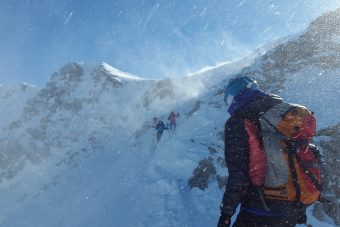One of the qualities of mental toughness is being able to keep on going when times are tough, pushing through new mental and physical barriers to achieve one’s goals. This resolve and perseverance often uses all 4 C’s of mental toughness at once, namely Control, Commitment, Challenge and Confidence.
However, equally there are times when saying no is the mentally tough thing to do, when experience tells you that keeping on going is absolutely not the right thing to do, even when you may be expected to do so by your inner self and your colleagues. In these situations it’s actually more courageous to say NO than to keep on going.
I was interested to read this recent article by Agron Lafiti in the Illawarra Mercury who contrasts these two differing states of mind in the lives of mountain climbers and how they respond to natural disasters.
As Lafiti explains “Finding the courage to quit while the quitting’s good is often the option for these men and women who test and challenge themselves by climbing 8000 metre mountains. Being ‘tough’ could mean giving up on a dream that may be within sight and is not without significant physical, emotional and financial investment”
In the first study Dr Christian Swann, from the University of Wollongong’s (UOW) Early Start Research Institute, along with collaborators Dr Lee Crust and Professor Jacqui Allen-Collinson from the University of Lincoln in the United Kingdom, looked to professional mountain climbers to explore the concept.
Their interviews with climbers revealed a more sophisticated idea of mental toughness.
‘’For me it was fascinating to really kind of critique what we thought we knew about mental toughness,’’ Dr Swann said.
‘’In other sports the idea of perseverance and pushing through no matter what really holds up very strongly.
‘’That is not necessarily the case with mountain climbers. The most mentally tough choose to give up on a dream when they realise the risks outweigh the rewards. For these mentally tough climbers, safety is absolutely first and foremost.’’
The second study published recently in the journal Psychology of Sport and Exercise, focused on experiences of survivors of the April 2015 avalanche that struck Mt Everest Base Camp.
In total, 22 climbers died and more than 60 were injured, making it the deadliest disaster in the history of climbing Mount Everest.
Yet, moments after the immediate danger passed, and conscious that climbers were still stranded at camps higher up the mountain, there were those who set about organising a recovery effort.
‘’It was really nice to tell their story. To our knowledge this is the only scientific study of really what’s involved in surviving that natural disaster,’’ Dr Swann said.
‘’It seems mental toughness actually is an important factor and allows you to respond proactively and constructively. There was one guy who was carrying injured climbers and bodies across base camp all day.
‘’Contrast that with the polar opposite response where people were going into their shell and sitting in their tents or curling up in a ball, literally in some cases, and not able to do deal with”
These two different examples showed the mental toughness trait at work albeit with the mountain climbers using their judgment, experience and personal capacity to come to the best outcome they could in the circumstances.
Original Post from Mental Toughness Partners


